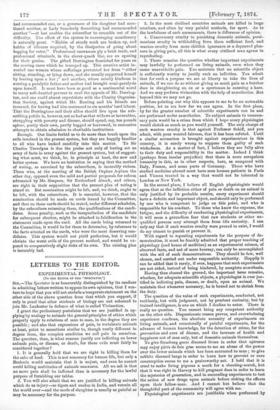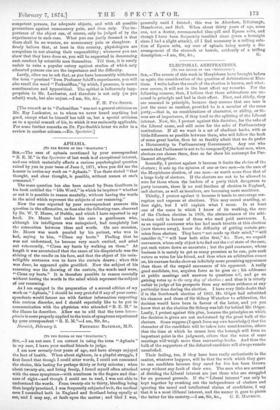LETTERS TO THE EDITOR.
EXPERIMENTAL PHYSIOLOGY.
[TO THE EDITOR OF THE "SPECTATOR.']
Stn,—The Spectator is so honourably distinguished by its candour in admitting letters written to oppose its own opinions, that I ven- ture to hope that you will not exclude a temperate statement on the other side of the above question from that which you support, if only in proof that other students of biology are not ashamed to join Mr. Lankester in defence of what is called Vivisection.
I grant the preliminary postulates that we are justified in ap- plying by analogy to animals the general principles of ethics which properly apply to relations of man to man, in the degree they are possible ; and also that expressions of pain, in vertebrate animals at least, point to sensations similar to, though vastly different in degree from, the complex condition we call pain in ourselves. The question, then, is what reasons justify our inflicting on lower animals pain, or disease, or death, for these evils must fairly be considered together ?
L It is generally held that we are right in killing them for the sake of food. This is not necessary for human life, but only a Brahmin would maintain that it is unjust, and even he cannot avoid killing multitudes of animals unawares. All we ask is that no more pain shall be inflicted than is necessary for the lawful purpose of furnishing our tables.
2. You will also admit that we are justified in killing animals which do us injury—as tigers and snakes in India, and vermin all the world over—and the mode of slaughter is usually as painful as may be necessary for the purpose. 3. In the most civilised countries animals are killed in large numbers, and often by very painful methods, for sport. As to the lawfulness of such amusements, there is difference of opinion.
4. Unnecessary cruelty in punishing domestic animals, parsi- monious cruelty in withholding from them sufficient food, and wanton cruelty from mere childish ignorance or a depraved plea- sure in giving pain, all this is what every civilised man agrees in reprobating.
5. There remains the question whether important experiments may lawfully be performed on living animals, even when they cause unavoidable pain. You maintain that no scientific object is sufficiently worthy to justify such an infliction. You admit that for such a purpose we are at liberty to take the lives of animals, if we can do so without giving so much pain as a butcher does in slaughtering an ox or a sportsman in coursing a hare. And we may perform vivisection with the help of aomsthetics. But beyond this we may not go.
Before pointing out why this appears to me to be an untenable position, let us see how far we can agree. In the first place, by far the greater number of scientific experiments can be and are performed under ansesthetics. To subject animals to unneces- sary pain would be a crime from which I hope every physiologist would shrink as much as you would yourself. The only charge of such wanton cruelty is that against Professor Schiff, and you admit, with your wonted fairness, that it has been refuted. Until a similar accusation is brought against experimenters in this country, it is surely wrong to suppose them guilty of such wickedness. As a matter of fact, I believe they are fully alive to their duty and responsibility in the matter. Indeed I think (perhaps from insular prejudice) that there is more scrupulous humanity in this, as in other respects, here, as compared with Italy, France, and some parts of Germany. Those who have studied medicine abroad must have seen human patients in Paris and Vienna treated in a way that would not be tolerated in London or New York.
In the second place, I believe all English physiologists would agree that as the infliction either of pain or death on an animal is only justified by its probable results, every experiment should have a definite and important object, and should only be performed by one who is competent to judge on this point, and who is responsible for his conduct. To those who know the expense, the fatigue, and the difficulty of conducting physiological experiments, it will seem a groundless fear that raw students or other un- qualified persons may attempt them from idle curiosity. I can only say that if such wanton cruelty were proved to exist, I would do my utmost to punish or prevent it.
With regard to repeating experiments for the purpose of de- monstration, it must be frankly admitted that proper teaching of physiology (and hence of medicine) as an experimental science, of observed facts, and not of mere hearsay, can only be accomplished with the aid of such demonstrations. They should be few, well chosen, and carried out under responsible authority. Happily it can be added that it rarely, if ever, happens that such experiments are not aided, instead of being hindered, by complete anoesthesia.
Having thus cleared the ground, the important issue remains, whether, for adequate scientifie objects, a physiologist is ever jus- tified in inflicting pain, disease, or death, upon an animal. We maintain that whenever necessary, he is bound not to shrink from the duty.
The question of the value of such experiments, conducted, not recklessly, but with judgment, not by prurient curiosity, but by trained intelligence, is one on which I decline to enter. There is really no question. You cannot bring any competent authority on the other side. Dispassionate reason proves, and overwhelming experience confirms, the absolute necessity of experiments on living animals, and occasionally of painful experiments, for the advance of human knowledge, for the detection of crime, for the prevention and cure of disease, and the increase of health and happiness not of men only, but of domestic animals themselves.
To give Strasburg geese diseased livers in order that epicures may enjoy pates de foie gras seems to me an abuse of the power over the lower animals which has been entrusted to man ; to give rabbits diseased lungs in order to learn how to prevent or cure consumption seems to me a praiseworthy act. I hold that it is cruel to make living pigeons a mark for a shooting-match, but that it was right in Harvey to kill pregnant does in order to learn the mysteries of generation, and in succeeding experiments to test the action of new drugs upon animals before risking the effects upon their fellow-men. And I cannot but believe that the thoughtful part of the community will agree with me.
Physiological experiments are justifiable when performed by competent persons, for adequate objects, and with all possible precautions against unnecessary pain, and then only. The im- portance of the object can, of course, only be judged of by the experimenter in each case. What you can justly demand is that there shall be no wanton, no unnecessary pain or slaughter. I firmly believe that, at least in this country, physiologists are scrupulous in not abusing their responsibility ; whenever you can show that they have done so, you will be supported in denouncing such conduct by scientific men themselves. Till then, it is surely unfair to raise a popular outcry against studies of which only educated persons can see the importance and the difficulty.
Lastly, allow me to ask that, as you have honourably withdrawn the term "prurient "from Professor Schiff's experiments, you will also recall the word " Pecksniffian," by which, I presume, is meant sanctimonious and hypocritical. The epithet is ludicrously inap- propriate to Mr. Lankeeter, and therefore is not only (as you admit) weak, but also unjust.—I am, Sir, &c., P. 11. PrE-Satrrff.
[The remark as to "Pecksniffian " was not a general criticism on Mr. Ray Lankeater, as to whom we never beard anything but good, except what he himself has told us, but a special criticism as to a special remark of his, to which it was eminently applicable. For some further remarks on Dr. Pye-Smith's letter we refer to a review in another column.—En. Spectator.]



































 Previous page
Previous page